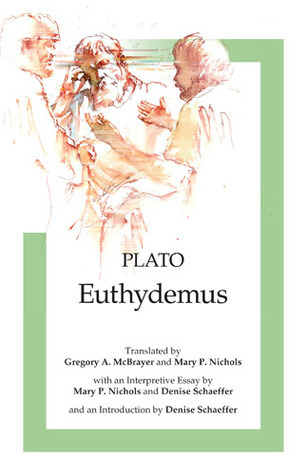

Euthydemus
Plato, Gregory A. McBrayer, Mary P. Nichols, Denise Schaeffer
3.68(761 readers)
From the
"Neglected for ages by Plato scholars, the Euthydemus has in recent years attracted renewed attention. The dialogue, in which Socrates converses with two sophists whose techniques of verbal manipulation utterly disengage language from any grounding in stable meaning or reality, is in many ways a dialogue for our times. Contemporary questions of language and power permeate the speech and action of the dialogue. The two sophists—Euthydemus and his brother Dionysodorus—explicitly question whether speech has any connection to truth and specifically whether anything can be said about justice and nobility that cannot also be said about their opposites." Focus Philosophical Library translations are close to and are non-interpretative of the original text, with the notes and a glossary intending to provide the reader with some sense of the terms and the concepts as they were understood by Plato’s immediate audience. Features Notes, glossary, and an interpretive essay.
"Neglected for ages by Plato scholars, the Euthydemus has in recent years attracted renewed attention. The dialogue, in which Socrates converses with two sophists whose techniques of verbal manipulation utterly disengage language from any grounding in stable meaning or reality, is in many ways a dialogue for our times. Contemporary questions of language and power permeate the speech and action of the dialogue. The two sophists—Euthydemus and his brother Dionysodorus—explicitly question whether speech has any connection to truth and specifically whether anything can be said about justice and nobility that cannot also be said about their opposites." Focus Philosophical Library translations are close to and are non-interpretative of the original text, with the notes and a glossary intending to provide the reader with some sense of the terms and the concepts as they were understood by Plato’s immediate audience. Features Notes, glossary, and an interpretive essay.
Publisher
Focus
Publication Date
8/6/2010
ISBN
9781585103058
Pages
112
Categories
About the Author

Plato
Plato (Greek: Πλάτων), born Aristocles (c. 427 – 348 BC), was an ancient Greek philosopher of the Classical period who is considered a foundational thinker in Western philosophy and an innovator of the written dialogue and dialectic forms. He raised problems for what became all the major areas of both theoretical philosophy and practical philosophy, and was the founder of the Platonic Academy, a philosophical school in Athens where Plato taught the doctrines that would later become known as Platonism.
Plato's most famous contribution is the theory of forms (or ideas), which has been interpreted as advancing a solution to what is now known as the problem of universals. He was decisively influenced by the pre-Socratic thinkers Pythagoras, Heraclitus, and Parmenides, although much of what is known about them is derived from Plato himself.
Along with his teacher Socrates, and Aristotle, his student, Plato is a central figure in the history of philosophy. Plato's entire body of work is believed to have survived intact for over 2,400 years—unlike that of nearly all of his contemporaries. Although their popularity has fluctuated, they have consistently been read and studied through the ages. Through Neoplatonism, he also greatly influenced both Christian and Islamic philosophy. In modern times, Alfred North Whitehead famously said: "the safest general characterization of the European philosophical tradition is that it consists of a series of footnotes to Plato."
Plato's most famous contribution is the theory of forms (or ideas), which has been interpreted as advancing a solution to what is now known as the problem of universals. He was decisively influenced by the pre-Socratic thinkers Pythagoras, Heraclitus, and Parmenides, although much of what is known about them is derived from Plato himself.
Along with his teacher Socrates, and Aristotle, his student, Plato is a central figure in the history of philosophy. Plato's entire body of work is believed to have survived intact for over 2,400 years—unlike that of nearly all of his contemporaries. Although their popularity has fluctuated, they have consistently been read and studied through the ages. Through Neoplatonism, he also greatly influenced both Christian and Islamic philosophy. In modern times, Alfred North Whitehead famously said: "the safest general characterization of the European philosophical tradition is that it consists of a series of footnotes to Plato."
Questions & Answers
Reader Reviews
Loading comments...